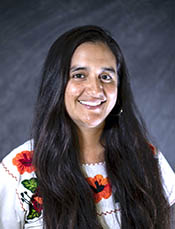This September we are highlighting Native Bruin – Carlie Domingues from the Chumash tribe – a Southern California tribe.
Carlie Domingues currently transitions from her M.A. scholarship at UCLA to a doctoral scholarship at UC Davis. She is part of UCLA class of 2020 and earned her Masters in American Indian Studies. At UCLA, she served as the co-president of the American Indian Graduate Student Association and co-founder of the California Indian Graduate Student working group, along with AnMarie Mendoza, a PhD candidate in Urban Planning, and Carolyn Rodriguez, PhD Candidate in Education. While at UCLA she focused on Indigenous California epistemology and ecosystems management as a place-based practice. In her research, she interned with Intertribal Agriculture Council, Santa Ynez Chumash Environmental Office, and USDA Natural Resources Conservation Service, to generate Chumash basketry plants and food systems for Santa Ynez Valley Watershed. In her doctoral research at UC Davis, she plans to work with Chumash communities and other Indigenous communities and/or Tribes invested in supporting women’s health and wellness and food security based on ancestral cultural agriculture and medicinal traditions, such as sustainable edible acorn food production, regeneration of Salmon, Deer, and Elk populations and tending of various other food and medicine plants. Rather than research ecosystems according to colonial science, Domingues seeks knowledge about healthy ecosystems from Indigenous people who often harbor this complex knowledge in their stories or Storywork, a term coined by education scholar Jo-Ann Archibald which validates Indigenous stories as data. Domingues’s thesis work looked at biographies of Indigenous California women Delfina Cuero, Mabel McKay, and Dorothy Parker as harboring research methods for Indigenous epistemological generation and how daily embodiment critically informs knowledge production systems, agriculture, and medicine for Indigenous people.
“In my time living and studying Tovaangnar at UCLA, I experienced the extent to which American infrastructure has destroyed Tongva livelihood. Although I yearned to see Gabrieleno Tongva people thrive and succeed in their culture and their homelands, I bared witness, instead, to American infrastructure built over critical resources, such as riparian ecosystems and former oak woodlands. I am grateful to the Tongva, Tatavium and Ajachamen relatives that I did spend time with to learn about their current experiences and quests for cultural revitalization and revival of healthy waterways in their homelands. I learned that although the violence and destruction has been harmful, current Gabrieleno Tongva continue to envision and work towards a Tovaangnar with healthy people, flowing rivers and clean oceans.”
